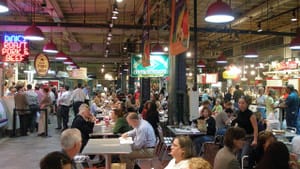Stay in the Loop
BSR publishes on a weekly schedule, with an email newsletter every Wednesday and Thursday morning. There’s no paywall, and subscribing is always free.
From W.C. Fields to Amazon.com
Philadelphia reinvented

It should come as no surprise that assorted Philadelphians have mobilized to tick off all the reasons why Amazon.com should locate its proposed second North American headquarters in Philadelphia.
- Inga Saffron, in Friday’s Inquirer, advises Amazon that in order to grow over the long term, the company needs a city “with a strong sense of place, a rich cultural life, great transit connections, and lots of infrastructure-ready land that is close to both the business center and to universities.” Guess which city she has in mind?
- Business columnist Joseph DiStefano, in Monday’s Inquirer, notes that Amazon needs 8 million square feet — and “the Navy Yard, the railroad land next to Drexel and Amtrak, the former factory districts of North Philadelphia, and sites in Montgomery, New Castle, and Camden Counties could fit that, with room to spare.”
- John Fry, president of Drexel University, writes: “Philadelphia has what Amazon wants. This is not the time to be bashful.”
Now, Bloomberg and Forbes
Not since the late 1940s, when Philadelphia staged an ambitious campaign to locate the United Nations headquarters here, has so much civic firepower been mustered toward a single goal. As I said, this in itself is not surprising. (Fry, as chairman of the Greater Philadelphia Chamber of Commerce, is the city’s designated head cheerleader.) No, what is surprising is that commentators elsewhere are touting Philadelphia as the best site for Amazon. For example:
- Forbes last week published an article headlined, “Why Amazon Should Put Its Next Headquarters in Philadelphia.” Writer Adam Ozimek cited Philadelphia’s relatively low cost of living, its amount of commercial real estate under construction, the number of universities in close proximity, and its major airport only 15 minutes from downtown.
- Bloomberg last week ran an article headlined, “DC Needs Amazon, but Amazon Can Do Better.” Philadelphia, suggested writer Megan McArdle, has “relatively cheap real estate, relatively good infrastructure, and an easy commute to Washington or New York. It also has a splendid food culture with lots of walkable amenities to keep your employees happy.”
Three reasons
Now, suppose you (like me) first arrived in Philadelphia in the 1960s, when a civic group called Action Philadelphia sought to rally local citizens behind the slogan, “Philadelphia Isn’t as Bad as Philadelphians Say It Is.” And suppose you dropped out of the sky into Center City today. You might well wonder: What on Earth is going on here?
Until perhaps 20 years ago, whenever I asked a new arrival what brought him or her to Philadelphia, the question elicited three answers, and only three answers:
- I went to college here, and I liked it and I stayed.
- I married a Philadelphian, and I liked it and I stayed.
- My company transferred me here, and I liked it and I stayed.
(The first two responses applied to me.)
That is, hardly anybody said, “Gee, I’d like to live in Philadelphia,” the way they might choose to live in New York or Chicago or San Francisco. My own daughters, both raised in downtown Philadelphia, moved to New York as soon as they graduated from college — not for a job or a husband (they had neither at the time) but for the sheer excitement of being at the center of the universe — an excitement that a slower, more provincial city like Philadelphia seemed unable to provide.
Compared to Brooklyn…
But lately, I increasingly encounter newcomers who say they’ve moved here for Philadelphia’s arts scene, or they’ve heard that actors can make a living here, or that it’s more affordable and more stimulating for retirees than, say, Lake Havasu City in Arizona.
BSR contributor Naomi Orwin is a case in point: She’s a teacher, writer, and inveterate city dweller who has lived and worked in Chicago, Manhattan, Los Angeles, London, Tel Aviv, the south of France, and Rochester, New York. Five years ago Naomi moved to Philadelphia with hardly any local connection. It just seemed like an ideal fit for her, she says.
To be sure, my daughters have no intention of moving back to Philly. On the other hand, my younger daughter, now a TV writer blissfully domiciled in Brooklyn, recently threw a birthday party attended by many of her New York writer colleagues. One such friend, upon hearing that I'm from Philadelphia, told me he’s moving here. When I asked why, he replied, “I can’t afford to live in New York. I can work anywhere — all I need is a laptop. I can serve my needs in Philadelphia for half the price. And if I need to see an editor in New York now and then, Amtrak will take me there in an hour and a quarter.”
The comedian W.C. Fields, a Philadelphia fugitive who often spiced his acts with digs at his native city, once joked that his epitaph would read: “Here lies W.C. Fields. I would rather be living in Philadelphia.” (His actual epitaph reads simply: “W.C. Fields 1880–1946.”) Today, actual living people in Seattle are contemplating investing $5 billion in Philadelphia.
“We shall not cease from exploration,” wrote T.S. Eliot in Little Gidding. “And the end of all our exploring will be to arrive where we started, and know the place for the first time.” In a world of constant change, not necessarily.
Sign up for our newsletter
All of the week's new articles, all in one place. Sign up for the free weekly BSR newsletters, and don't miss a conversation.
 Dan Rottenberg
Dan Rottenberg